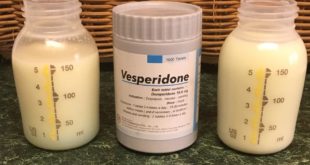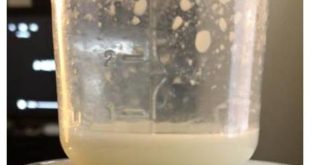Ask Anne
 Question: My baby girl is five months old and exclusively breastfed. She feeds every three hours during the day for short times (10-15 minutes), and sometimes I feed her once during the night if I can’t get her back to bed.
Question: My baby girl is five months old and exclusively breastfed. She feeds every three hours during the day for short times (10-15 minutes), and sometimes I feed her once during the night if I can’t get her back to bed.
I’d like to nurse for twelve months, but recently I noticed a drop in my production. I don’t know if it’s a coincidence or not, but I just got my first period and noticed the drop right around that time. I thought maybe it was hormonal, but my doctors says there isn’t a connection between the two.
Is it normal for me to start my period so soon? Could it be that I’ll have this problem every month? And is there any way to keep my supply from dropping?
Answer: Just about anything is considered “normal” when it comes to having periods during breastfeeding. All women will experience a period of postpartum bleeding (lochia) in the early weeks following giving birth, but this is not considered a ‘real’ period. Some mothers won’t menstruate for months or even years while they are nursing, and may not have a period until their baby is completely weaned. Most commonly, mothers will resume menstruation soon after their baby starts eating solid foods or sleeping through the night.
When you start your period depends on many factors: how often your baby nurses, how long she is sleeping at night, whether she takes supplemental feedings of formula or solids, whether she uses a pacifier, and also your individual body chemistry and how it responds to the hormonal changes associated with lactation.
The most important factor seems to be the amount of breast stimulation the mother receives. Whenever the amount of stimulation is decreased (especially during the night), then she is likely to start her period soon after this occurs.
Some mothers do notice a temporary drop in their milk supply during the days just before their period starts, and for a few days afterward. As soon as bleeding starts, hormone levels start returning to normal, and the milk supply will increase quickly.
Due to hormonal changes, the taste of the milk may change slightly just before your period starts, and some babies may respond to this by nursing less. Some women experience nipple tenderness during ovulation, or in the days before their period starts.
If any of these symptoms are severe, you can try treating them by adding a calcium/magnesium supplement to your diet. The supplement may help by preventing the drop in blood calcium levels, which can cause nipple tenderness, a decrease in milk supply, and sometimes uterine cramping.
The recommended dosage is 1500 mg calcium/750 mg magnesium. Some combination pills also contain zinc, and that’s fine.
Start taking it around the time you ovulate, and continue through the first few days of your period. Calcium is absorbed most efficiently when taken no more than 500 mgs at a time, so divide it into several doses throughout the day.
If your cycles aren’t regular yet and you don’t know when you ovulate, you can take the supplement for the whole month until your periods are more regular.
In addition to starting your period, there are other factors that might be involved in your supply issues.
Your little girl is at the stage where babies often start nursing for shorter periods of time. At this age, they are very interested in their surroundings, and may rush through feedings so that they can look around the room or play with toys. Most babies are very efficient nursers by this time, so they are able to get the milk they need much faster than when they were newborns, and they don’t nurse as long at a time.
Another possibility is that she may be giving some signs of her readiness for solids. Check out the article Starting Solids for more suggestions.
Anne Smith, IBCLC
Breastfeeding Basics
 Breastfeeding Basics
Breastfeeding Basics




